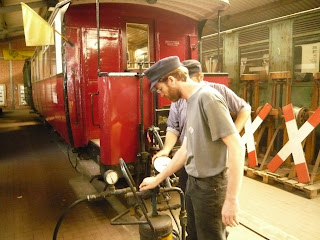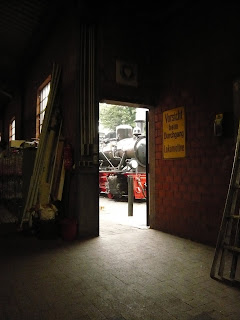 The day started with firing up the locomotive. It took about 4 hours from lighting the first firewood in the firebox until steam pressure was within operating range. Meanwhile, stoker ("Heizer") Christoph and engineer ("Lokomotivfuehrer") Thomas explained the very basics how a steam locomotive works, and we had the pleasure of oiling, cleaning, and polishing the locomotive. Yes, cleaning and polishing, too.
The day started with firing up the locomotive. It took about 4 hours from lighting the first firewood in the firebox until steam pressure was within operating range. Meanwhile, stoker ("Heizer") Christoph and engineer ("Lokomotivfuehrer") Thomas explained the very basics how a steam locomotive works, and we had the pleasure of oiling, cleaning, and polishing the locomotive. Yes, cleaning and polishing, too. After lunch everyone got to move the locomotive within station limits to practice accelerating and braking. There are two mechanisms to control acceleration: Amount of steam sent to the cylinders and amount of steam expansion within the cylinders. The general effect is similar to gears in a car. High gear at high speed uses less gas, but barely has enough torque to get the car moving in the first place. Some steam with little expansion in the cylinders gets the locomotive moving. Relying more on steam expansion in the cylinders once the train is moving saves steam pressure and therefore fuel.
 Braking is quite an art. The trains on the Selfkantbahn like most trains use an air brake system which uses air pressure to control brake cylinders in each car. The practical implication for a novice engineer is that contrary to a car,it will take a few seconds for braking to take effect, and the train will keep braking at the given pressure set in the main brake line. When the brake is released only slightly, it will fully release the brakes at each car, and on top of that it will take several seconds for the locomotive to re-pressurize the main brake line. We got to practice this on a demo system in the car hall.
Braking is quite an art. The trains on the Selfkantbahn like most trains use an air brake system which uses air pressure to control brake cylinders in each car. The practical implication for a novice engineer is that contrary to a car,it will take a few seconds for braking to take effect, and the train will keep braking at the given pressure set in the main brake line. When the brake is released only slightly, it will fully release the brakes at each car, and on top of that it will take several seconds for the locomotive to re-pressurize the main brake line. We got to practice this on a demo system in the car hall.There is also a direct brake system on the locomotive only, which is generally used when the locomotive is moving without a train, or, if we have a train, similarly to a hand brake in the car when going uphill from a full stop: Hold the train in place, while the brakes in the cars are already released.
 During my practice run in the afternoon the main brake line overloaded (too much pressure). This caused quite a commotion since it was unclear why this had happened in the first place. I was standing in the locomotive twisting thumbs and making a stupid face, while both Christoph and Thomas got to figure out what happened, and decide whether it's safe to continue the trip. In the end the net effect was that we got to de-pressurize and re-pressurize the brake system.
During my practice run in the afternoon the main brake line overloaded (too much pressure). This caused quite a commotion since it was unclear why this had happened in the first place. I was standing in the locomotive twisting thumbs and making a stupid face, while both Christoph and Thomas got to figure out what happened, and decide whether it's safe to continue the trip. In the end the net effect was that we got to de-pressurize and re-pressurize the brake system.All in all, I think I did O.K. Under direction from Thomas I brought the train up to speed, slowed down and stopped before railroad crossings, rang the bell, and, to my utmost delight, blew the whistle. The interaction between steam pressure and steam expansion is not yet quite clear to me so Thomas had to guide me a bit, but I think I managed to do a decent job.
 It was a hot day, and being in the cab was even hotter with the fire burning like crazy 2 feet before you. The cab was very crowded with stoker, engineer, and two seminar participants, one driving, one trying not to be too much in the way, paying attention to instructions, shoveling coal, or refilling the boiler with water. We went through several liters of bottled water and "Apfelschorle" on each run. Replacing the empty bottles when we got back to Schierwaldenrath became an important chore.
It was a hot day, and being in the cab was even hotter with the fire burning like crazy 2 feet before you. The cab was very crowded with stoker, engineer, and two seminar participants, one driving, one trying not to be too much in the way, paying attention to instructions, shoveling coal, or refilling the boiler with water. We went through several liters of bottled water and "Apfelschorle" on each run. Replacing the empty bottles when we got back to Schierwaldenrath became an important chore. The practice runs happened to be two specials with paying customers from Schierwaldenrath to Gillrath. Yup, the whole, whopping 5.5km of track all the way from one end to the other end of the line.
The practice runs happened to be two specials with paying customers from Schierwaldenrath to Gillrath. Yup, the whole, whopping 5.5km of track all the way from one end to the other end of the line. The first run was booked by a Mazda fan club. Quite a sight when 40 Mazda sports cars along with their owners and respective girl friends enter a railroad museum in their shiny, little cars passing "our" shiny little steam engine.
The other run was for the youth group of a local fire department, as well as a birthday party in one of the cars.
After we returned with the second run to Schierwaldenrath, we had coffee and cake, watched/helped set the fire for the night and left the locomotive in the engine shed for the next day. Later in the evening the group had dinner together, and we had a fun time. The fact that I'm living in California was drawing quite some attention and many questions about life and work especially in comparison to Germany.
 Tomorrow I will drive the 13:45 train from Gillrath to Schierwaldenrath, which -- for extra fun -- runs with the locomotive backwards, and therefore the controls will be behind me when looking on the track ahead of the locomotive. I'm curious if Wolfram will be here in time for the 11:15 departure which will be driven by my dad.
Tomorrow I will drive the 13:45 train from Gillrath to Schierwaldenrath, which -- for extra fun -- runs with the locomotive backwards, and therefore the controls will be behind me when looking on the track ahead of the locomotive. I'm curious if Wolfram will be here in time for the 11:15 departure which will be driven by my dad.Friday - Sunday

1 comment:
Sehr interessant geschrieben... kann es kaum erwarten, dass Du über Sonntag schreibst. =:)
Post a Comment